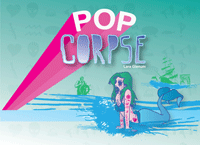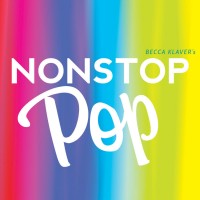Girl is Totes Sketch

 Pop Corpse
Pop Corpse
by Lara Glenum
Action Books, May 2013
186 pages / $12-16 Buy from Action Books or SPD
&
Nonstop Pop
by Becca Klaver
Bloof Books, April 2013
36 pages / $8 Buy from Bloof Books
There is certainly a widespread fascination with Pop in women’s writing and performance today. From the Warholian Pop Vanessa Place Inc., to Lady’s Gaga ARTPOP album, women’s culture has embraced the “lowbrow” of POPular culture, it’s would-be nemesis. Lara Glenum’s Pop Corpse and Becca Klaver’s Nonstop Pop, are two such examples. In an endless purposeful regression towards their inner fucked up girly girl, Klaver and Glenum explore not only in the language of pop but also in the relationship between the paranoid nature of pop and the always already dead and doubted girl.
Glenum’s Pop Corpse takes place in a post-apocalyptic ecological wasteland—literally, an unda-tha-sea Little Mermaid remix that takes place in a world devoid of terra firma, an archipelago of “floating islands of plastic garbage.” The book follows an asexual mermaid named XXX on her quest to give herself a vagina by any means (cleverly troping on the desexed Little Mermaid, who perhaps didn’t only wish for legs)—whether this means self-cutting, visiting the Sea Witch, or killing The Smear, the philosophizing love interest. XXX is publicly shamed for self-mutilation, and quarantined in a “RE-EDUCATION CAMP 4 THE SEXUALLY DEVIANT,” where she films her own self-mutilation, presumable broadcasting it on the underwater internet. Written in dramatic form, and utilizing pop-slang and e-slang, here, pop is a language, a way of thinking, but it also predicates pain and suffering for the mermaids. In many ways, Glenum’s scoring of feminine affect reads like a transcription of a hyper-girly Ryan Trecartin film. The mermaids talk like they’re texting: “Ever since the ocean’s gone toxic and the earth’s been burnt to a crisp, she’s been totes sketch.” And the male characters have absorbed the ironic, sexist adolescent boy humor that dominates American capitalist entertainment discourse: “Try kissing one sometime. It’s like giving a rim job to a dysentery victim. With really long ass hair.” Yet, the language remains manic, and at times is theoretically lucid. For instance, an Undersea Denizen observes that the King and Queen of the Sea are “openly oppressing us by persistently courting/curtailing our lines of sight with the spectacle of their Vision Machines […] a culturally-produced spectacle that naturalizes highly specific forms of desire and consumption.”
It is these acute observations about the spectacle of commodity that Becca Klaver’s Nonstop Pop performs. In this way, Nonstop Pop always predicts loss, even when it does not explicitly perform it. In a neoconfesional meets Flarf vein, the poems are a mix of lineated reflections and prose meditations that struggle with the ridiculous demands of consumerism—“less treadmill, more Skechers Shape-Ups” and “I was like so … Geico/ And you were like so… Activia”—as well as a troubled attachment to a more adolescent, indeed girlish, relation with capitalist commodity—from “Schwarzeneneggery”: “She knows she’s not supposed to love it but knows that’s why she does […] she presumes to be a muscleman.”
September 16th, 2013 / 11:05 am
